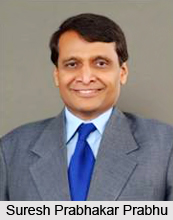 Suresh Prabhakar Prabhu is an Indian politician hailing from Maharashtra. He is now serving as the Railway Minister of India in the Cabinet Ministry of Government of Narendra Modi. Suresh Prabhakar Prabhu is a well known face in Bharatiya Janata Party (BJP).
Suresh Prabhakar Prabhu is an Indian politician hailing from Maharashtra. He is now serving as the Railway Minister of India in the Cabinet Ministry of Government of Narendra Modi. Suresh Prabhakar Prabhu is a well known face in Bharatiya Janata Party (BJP).
Early Life of Suresh Prabhakar Prabhu
Suresh Prabhakar Prabhu was born on 11 July 1953. He is a Chartered Accountant by profession and a member of the Institute of Chartered Accountants of India since 1996.
Suresh Prabhakar Prabhu completed his high school from Sharadashram Vidya Mandir, Dadar, Mumbai, followed by a Bachelor in Commerce with Honours from M.L. Dahanukar College, Vile Parle in Mumbai. After that, he received a Bachelor in Law degree from the New Law College, Mumbai. Suresh Prabhakar Prabhu is a Chartered Accountant and a member of the Institute of Chartered Accountants of India.
Political Career of Suresh Prabhakar Prabhu
Suresh Prabhakar Prabhu has been a repeatedly elected Member of Parliament from Rajapur Lok Sabha constituency in Maharashtra as a member of the Shiva Sena, a political party hailing from Maharashtra.
Suresh Prabhakar Prabhu quit Shiv Sena and joined Bharatiya Janata Party on 9th November, 2014. After that, he became the Railway Minister of India under the Union Cabinet Ministry of Narendra Modi.
Suresh Prabhakar Prabhu came into the limelight of national political scenario under Shiva Sena various times during the Prime Ministership of Atal Bihari Vajpayee of 1998 to 2004. Then he served as the Minister of Industry, Minister of Environment and Forests, Minister of Fertilizers and Chemicals, Power, Heavy Industry and Public Enterprises. As the Union Minister for Power in Atal Bihari Vajpayee Cabinet, he won praise for his performance. As Minister of Power, Suresh Prabhakar Prabhu introduced major reforms in India`s power sector. Suresh Prabhakar Prabhu is credited with championing and enacting the Electricity Act of 2003 and the reforms that created securitization of dues from the states of India.
Suresh Prabhakar Prabhu has been elected four times to the Lok Sabha, the Lower House of Indian Parliament, from Maharashtra since 1996. However, he lost his seat in the 2009 general election. He also served as the Chairman of Task Force for Interlinking of Rivers with a status and rank of Union Cabinet Minister. He was also elected as a member of the World Bank Parliamentary Network and chaired the South Asia Water regional group of the World Bank.
On 9th November 2014, Suresh Prabhakar Prabhu was sworn-in as Cabinet Minister in Union Government of Narendra Modi.
Personal Life of Suresh Prabhakar Prabhu
He is married to the journalist Uma Prabhu. The couple is blessed with a son, whose name is Ameya Prabhu. Suresh Prabhakar Prabhu is currently residing in Mumbai and Delhi.




















